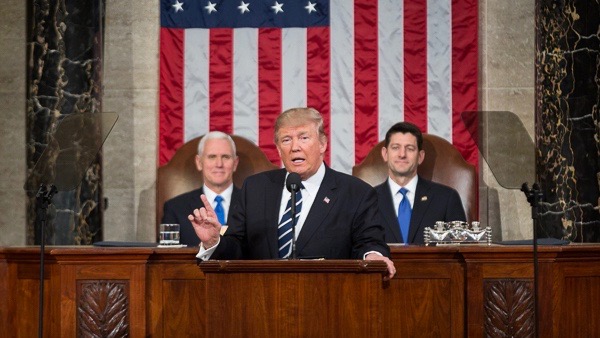White House news recapped, political science professors give their take

Controversies around Trump adminstration continues in March, as Trump accused Obama for wiretapping, the President issued his second travel band, and FBI launched an investigation on Russia’s involvement during the election.
March 24, 2017
At the end of February, President Donald Trump addressed the Congress with a speech that was well-regarded by a large portion of the country. Polling had the speech at a 70 percent approval rating and many media outlets were referring to Trump’s actions as presidential, a term many media outlets have been hesitant to use for their news coverage on Trump.
Things have gone downhill for Trump since the speech. Four days later, the President tweeted out an angry accusal of former President Barack Obama, claiming with no evidence that the previous administration had wiretapped Trump’s towers during the campaign and calling Obama a “bad (or sick) man.” This capped an entire week of allegations and recusals that have given rise to questions about the integrity of the Trump administration.
After former National Security Advisor Michael Flynn was forced to resign from his position due to potentially illegal communications with Russian Ambassador Sergey Kislyak, the Trump administration decided to come out swinging against any allegations towards other members of the cabinet’s regarding to Russia. Attorney General Jeff Sessions was under suspicion and being pushed to recuse himself from any Justice Department investigations regarding Russia, due to two meetings with the same Russian ambassador that he had failed to disclose during Senate testimony for his appointment.
Karen Beckwith, chair of the Department of Political Science at Case Western Reserve University, says that Sessions’ behavior is troubling.
“When asked in committee, Sessions denied having any contact with the Russian Ambassador.” Beckwith explained. “As it turns out he had two contacts with the Russian ambassador and so either he was not honest with the committee or he doesn’t have the extent of memory necessary to remember those meetings. Both are problematic for an Attorney General.”
The Russia-related drama continued on into this week for the White House, when FBI director James Comey revealed to the public that his agency was actively investigating Trump campaign officials for ties to Russia and coordination with the Russian government during the campaign. The announcement was made during testimony in front of Congress at a hearing called to investigate the validity of Trump’s wiretapping claims, which the director also refuted, saying that he had “no information” to support the President’s accusations.
On the immigration-front, on March 6, the Trump administration doubled down on its travel ban executive order, issuing with little fanfare a reworked ban that removed Iraq from the list of prohibited countries and made various other changes. The ban has since been suspended by a federal judge in Hawaii, but is still affecting the United State’s global relations.
Professor Elliot Posner, an international relations specialist in the Department of Political Science, described how re-issuing the travel ban fits into Trump’s consistent ability to put the rest of the world on edge.
“Most of the world thinks that the U.S. benefits much more in the current open liberal economic order than everyone else. So, they must be completely perplexed by these actions,” Posner explained.
He continued, “When the Trump administration tells the world that it’s gonna be America first, much of the world already thinks that the world is set up that way. It must look like to them like we’re shooting ourselves in the foot.”



